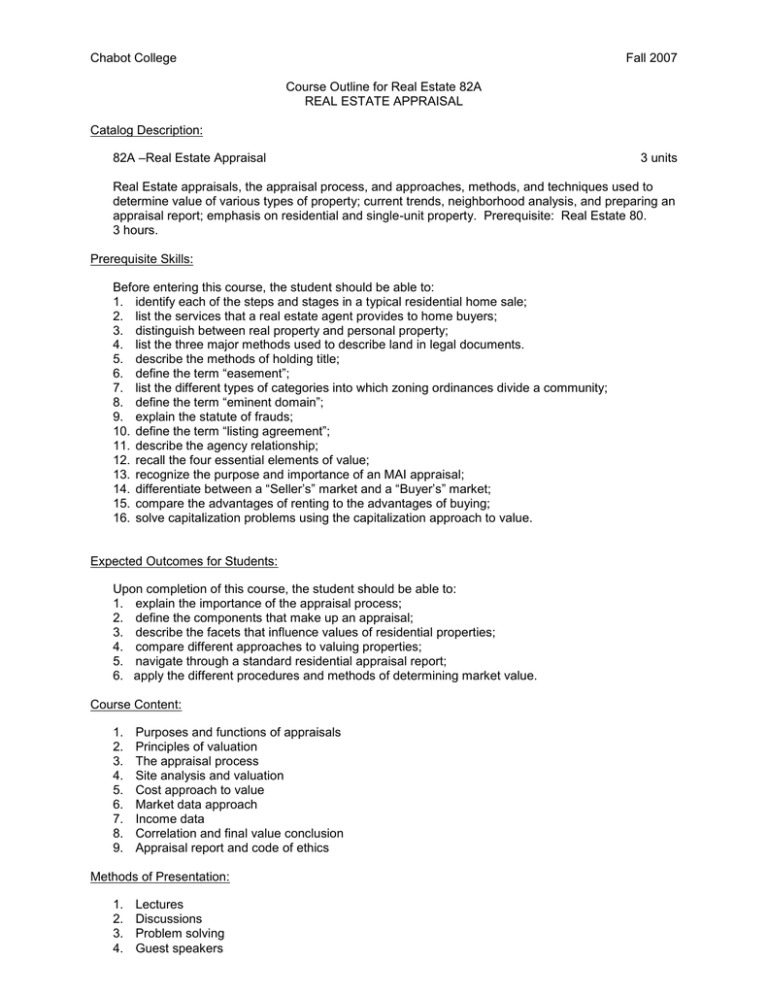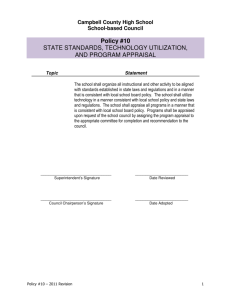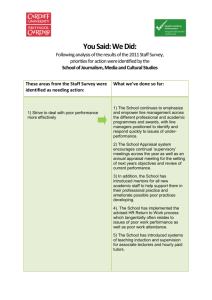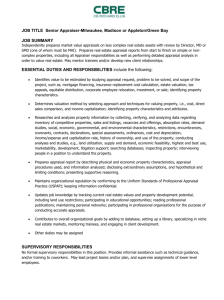Chabot College Fall 2007 Course Outline for Real Estate 82A
advertisement

Chabot College Fall 2007 Course Outline for Real Estate 82A REAL ESTATE APPRAISAL Catalog Description: 82A –Real Estate Appraisal 3 units Real Estate appraisals, the appraisal process, and approaches, methods, and techniques used to determine value of various types of property; current trends, neighborhood analysis, and preparing an appraisal report; emphasis on residential and single-unit property. Prerequisite: Real Estate 80. 3 hours. Prerequisite Skills: Before entering this course, the student should be able to: 1. identify each of the steps and stages in a typical residential home sale; 2. list the services that a real estate agent provides to home buyers; 3. distinguish between real property and personal property; 4. list the three major methods used to describe land in legal documents. 5. describe the methods of holding title; 6. define the term “easement”; 7. list the different types of categories into which zoning ordinances divide a community; 8. define the term “eminent domain”; 9. explain the statute of frauds; 10. define the term “listing agreement”; 11. describe the agency relationship; 12. recall the four essential elements of value; 13. recognize the purpose and importance of an MAI appraisal; 14. differentiate between a “Seller’s” market and a “Buyer’s” market; 15. compare the advantages of renting to the advantages of buying; 16. solve capitalization problems using the capitalization approach to value. Expected Outcomes for Students: Upon completion of this course, the student should be able to: 1. explain the importance of the appraisal process; 2. define the components that make up an appraisal; 3. describe the facets that influence values of residential properties; 4. compare different approaches to valuing properties; 5. navigate through a standard residential appraisal report; 6. apply the different procedures and methods of determining market value. Course Content: 1. 2. 3. 4. 5. 6. 7. 8. 9. Purposes and functions of appraisals Principles of valuation The appraisal process Site analysis and valuation Cost approach to value Market data approach Income data Correlation and final value conclusion Appraisal report and code of ethics Methods of Presentation: 1. 2. 3. 4. Lectures Discussions Problem solving Guest speakers Chabot College Course Outline for Real Estate 82A, Page 2 Fall 2007 Assignments and Methods of Evaluating Student Progress: 1. Typical Assignments a. Select a property in your community as a potential subject for an appraisal. Describe the property, including the outbuildings, primary structure and external improvements. b. “Data Gathering” exercise- identify methods you would use to gather information pertaining to the specific subject property. What would be the 10 most important items? List and identify each in descending order of importance. c. Social and Economic influencing factors- name the key social and economic factors relating to value of the above named subject property. Explain how social and economic factors differ from property specific factors. Support your explanation with examples of each. 2. Methods of Evaluating Student Progress a. Examinations b. Assignments c. Final Examination Textbook(s) (Typical): Basic Real Estate Appraisal, Betts & Ely, Southwestern, 2005 Special Student Materials: None JM/Sept2006 Revised 10/11/06, 11/3/06 RE82A





